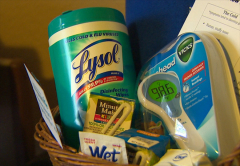
 Visiting Angels protects seniors with “Fight the Flu Kits” to prepare for peak flu season
Visiting Angels protects seniors with “Fight the Flu Kits” to prepare for peak flu season
This year’s vicious flu epidemic has threatened local seniors, and now their caregivers are fighting back by handing out “Fight the Flu Kits,” to help prepare seniors for the peak of the flu season, January and February.
Weaker immune systems make seniors more vulnerable to the flu, and that’s why 90 percent of all flu-related deaths and more than half of flu-related hospitalizations occur in people age 65 or older*. The flu is an even bigger scare for seniors this year because the flu shot is not effective against half of all flu strains. If seniors get the flu it compromises their body’s ability to fight other infections, such as pneumonia which can be deadly.
That’s why Visiting Angels, one of the nation’s largest in-home senior care companies, with a center in our area, is helping local seniors in three ways:
1. Assembling a Visiting Angels “Fight the Flu Kit”
2. Caregivers can help sanitize seniors’ homes and run their errands so they don’t have to expose themselves to viruses in crowded areas, such as the grocery store and the mall.
3. Caregivers can help seniors spot the difference in symptoms between the flu and the “stomach bug.” They can transport seniors to the doctor or hospital if necessary.
Visiting Angels “Fight the Flu Kits” include: (items available at most retail stores)
• Bottled water – water helps the body produce and circulate immune system cells to fight off viruses. Proper hydration also keeps nasal passages moist to help trap and get rid of tiny particles carrying illness-causing bacteria.
• Paper towels – encourage seniors to use paper towels in the bathroom instead of hand towels, which can harbor germs.
• Thermometer – if seniors have a fever higher than 102 degrees, that could indicate they have the flu.
• Pocket-size hand sanitizer, with aloe – helps keep seniors’ skin germ-free without drying out their sensitive skin.
• Pens – seniors should always have their own pen handy – pens shared in public areas carry a ton of germs.
• Disinfectant spray – reminder for seniors to spray doorknobs, handles, and light switches, etc. at least once a week – viruses can live up to 48 hours on plastic and stainless steel surfaces.
• Hand soap – recent studies show plain soap and water works just as well, if not better, than antibacterial soaps and hand sanitizer. But seniors need to scrub hands for at least 20 seconds to kill the germs!
• Hand sanitizer wipes – these are handy to have on-the-go, whether to clean hands or public surfaces. Seniors should not rely on baby wipes because they do not contain the proper ingredients to kill viruses and germs.
“Often seniors don’t think of themselves as elderly, so they tend to ignore health warnings and resent loved ones ‘telling them what to do,’” said Larry Meigs, CEO of Visiting Angels. “Our caregivers can help nudge a senior to take the proper steps to try and protect themselves from the flu and to get them help if they do catch the virus. They’re also an extra set of eyes who can help a senior determine if they may have the flu or a stomach bug simply by being aware of the difference in symptoms.”
Symptoms of the flu:
One of the biggest myths about the flu is that is causes vomiting. But the flu is actually a highly contagious respiratory disease and vomiting is not on the list of typical flu symptoms.
• fever
• headache
• muscle aches
• sore throat
• cough
• chills
• runny nose
• fatigue
Symptoms of the “stomach bug:” (gastroenteritis)
Most people recover completely. Stomach bugs can be serious for the elderly who may be unable to drink enough fluids to replace what they lose through vomiting and/or diarrhea.
• nausea
• vomiting and/or diarrhea
• possible fever



